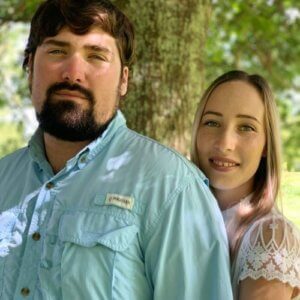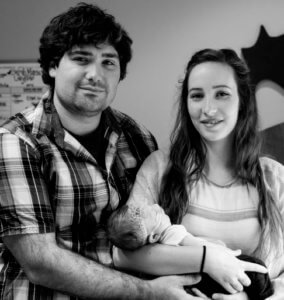Couple who are carriers of fatal genetic disease chosen as Gift of Hope IVF Grant 2019 recipients
Vanessa and Chandler Langlois, of Plaquemine, Louisiana, received the Gift of Hope IVF Grant 2019. The award gives them the chance to build their family through a free in vitro fertilization cycle with PGT-M (preimplantation genetic testing for monogenetic disease) from Fertility Answers.

Vanessa and Chandler designed their lives around the children they would one day have. They would buy a home, then start their family and live happily ever after. Not long after they married, they bought their home and the two blue lines on their pregnancy test revealed that they were also pregnant. “Everything was going as we planned it,” remembers Vanessa. “My doctors appointment were going perfectly, her nursery was finally finished, and I absolutely loved feeling this life we created move and kick inside me.”
In January 2018, Vanessa and Chandler’s daughter Sarah was born. But what should have been a joyous, happy occasion turned into an awful nightmare. They knew something was wrong with Sarah when she turned blue and wasn’t moving soon after birth. A few weeks later, doctors informed them that Sarah had a fatal genetic disease called Zellweger Syndrome and that she had only a few months to live. Sarah passed away at six weeks.
“I felt betrayed by my own body,” says Vanessa. “I was furious at myself for giving my little girl the very disease that took her from me. This one little gene that Chandler and I carried has taken so much from us.”
Zellweger Syndrome is a condition that is genetically transmitted.
Chandler and Vanessa are genetic carriers for Zellweger Syndrome, the most severe form of an inherited disease called Zellweger spectrum. The disease is an autosomal recessive condition caused by mutations in any one of at least 12 different genes that are involved in the creation and proper function of peroxisomes, the structures in cells that are involved in many chemical processes needed for the body to function properly. There is no cure or treatment for Zellweger and infants, like Sarah, born on the severe end of the Zellweger spectrum typically do not survive past the first 6 months of life.
Because Zellweger Syndrome is an autosomal recessive condition, the disease was passed down to Sarah from both her parents who each carry a mutated copy of the gene. As carriers, Vanessa and Chandler do not have signs or symptoms of the condition themselves. However, any child they have has a 25% (1 in 4) risk to have the condition, a 50% (1 in 2) risk to be a carrier, and a 25% chance to not have the condition and not be a carrier.
Like any person who has been through a life trauma, Vanessa tried to repair what had been broken. She tried to plan a new life, one that didn’t need kids. But no plan that she came up with could fill the void in her heart. “I felt in my heart that if I was ever going to be me again I needed kids,” says Vanessa. She started asking questions, doing research, and speaking with doctors. After talking with a local geneticist, she learned that she could be assured of children without the disease by doing in vitro fertilization with preimplantation genetic testing for monogenetic disease, PGT-M, performed on each embryo.
By testing embryos using preimplantation genetic testing, doctors can ensure that your children will be free from a heritable genetic illness.
“There was hope that we could have the family we dreamt of,” says Vanessa. She did further research on IVF but instead felt terrified. What she thought would be simple and easy instead was a procedure that involved needles, medications, a whole team of doctors, and a lot of money that they didn’t have. “All of this made my head spin,” says Vanessa.”My daughter hadn’t even been gone a year and I was trying to find a way to have another baby. My grief kicked in and I instantly felt guilty. I quickly had to put this thought to the back of my mind.”

But the knowledge that there was a way to have a baby without the disease kept resurfacing until she couldn’t ignore it any longer. She and Chandler discussed it and decided that they at least needed to find out more. They sought out Dr. John Storment at Fertility Answers in Baton Rouge who explained how the IVF procedure with PGT-M worked.
The procedure starts out like a normal IVF cycle where the ovaries are stimulated to create mature eggs which are then retrieved and fertilized. The resulting embryos, however, go an extra step before they are transferred back into the uterus for hopeful implantation. Each embryo that makes it to blastocyst stage, typically around 5 to 7 days of growth, are biopsied by extracting a few cells off of their outer layer and sent to a specialized lab. A geneticist will then examine the DNA in the cells from each embryo to locate the specific gene associated with the genetic disease in question. The embryos are then classified as either having the disease, being a carrier of the disease, or being disease free.
However, when the couple discovered what the cost of IVF with PGT-M would be, Vanessa felt sick. “I didn’t say a word during the entire meeting with the financial advisor because I was too busy fighting back the tears and trying to swallow the lump that had formed in my throat,” she says. Once again they saw their dream of a family slipping away.
The Gift of Hope, sponsored by Fertility Answers and Ovation Fertility, offers a free IVF grant to one couple each year.
Vanessa and Chandler left the appointment crushed. How could they make this possible for them? They thought about selling a car or even the house and moving somewhere cheaper. And then Vanessa remembered Dr. Storment telling them about the Gift of Hope program and the free IVF grant that was given to one couple every year. She quickly researched the program, gathered what she needed for the application and sent it in.
“I am willing to do whatever it takes and to continue to fight for the mother I once was. I want to be her again,” confesses Vanessa. “No one dreams of having their baby through IVF, but this has become our dream.”


